Hello and welcome back to What China Wants.

In today’s episode Stewart and Sam speak to one of the leading thinkers on technology policy, Rob Atkinson from the Information Technology and Innovation Foundation (ITIF). An old friend of the show, Rob joins us to talk through the realities of what British Prime Minister calls for a “Nato for tech” to counter Chinese influence.
Here is a summary of our discussion:
Rishi Sunak has called for a Nato of technology to protect Western interests against China.
We discuss how an arrangement would work, for example would there be shared collective responsibility, and a minimum level of investment? What would happen if there was an issue and some of the members didn’t respond?
Rob argues that Europe has been on the sidelines while the US has been taking China to task on problematic trade policies.
US policies like the cutting off of advanced microchips to China, and the Chip 4 alliance, are evidence that Washington is now using trade as a weapon against Beijing. The question is, will Europe help with this?
You can also listen to the podcast on Apple, Amazon, or Spotify.
As always please do share, comment, and subscribe. We’ll be back soon with more What China Wants.
Many thanks for listening. In the meantime, if you would like more information about the Evenstar Institute and our research, then please email me sam.olsen@evenstarglobal.com
***
Here is the transcript:
Sam Olsen: Hello, and welcome back to What China Wants with me, Sam Olsen, and Stewart Paterson as always. Today, we are going to be joined by someone who has been on the newsletter before, actually a few times, and someone that I have very much enjoyed reading about over the years. It is Rob Atkinson, who is, as you probably remember, the Founder and President of the Information Technology and Innovation Foundation, ITIF, which many consider to be the world's leading think tank on Science and Technology policy. Welcome back, Rob.
Rob Atkinson: Thanks a lot for having me, Sam and Stewart.
SO: So we are very keen to have a chat today because, as you know, we have got a new, well the latest in a long line of new Prime Ministers, in the United Kingdom, Rishi Sunak. He has spoken about something which I know is close to your heart, and which perhaps, is considered more and more by people in your country, in our country, and in fact, all the West to be of paramount importance, and that is securing the technology supply chain against what is perceived to be nefarious Chinese influence. You and I did an interview maybe a year or two ago about this very thing, so it is fascinating to see Rishi Sunak talk about it in his hustings to become the new leader of the Conservative Party and Prime Minister.
But maybe we can just start from the beginning, for those who did not read those previous newsletters, can you just explain to our listeners, what it is that you actually have called for in the past regarding a NATO of trade, a NATO of technology, and why think it is important?
RA: Sure. So, there are two related concepts: a NATO for trade and a NATO for technology. We proposed in a Washington Post op-ed a NATO for trade, right around the time that when wolf warrior diplomacy was maybe at its apex, they might have toned it down a bit since, because the Chinese eventually figure these things out. But when you threaten other diplomats with a shotgun, and when you just cut off trade because you do not like what some country has done in a diplomatic way, which is what China does, it is basically bullying, and it is finding the weakest players in the link and bullying them basically to kowtow to China.
What we proposed was, look, this is ridiculous; allied, free, democratic nations need to stand with one another so that an attack on one is an attack on all. So, if China says to Australia, "hey, we didn't like what you say about the Wuhan flu, we are going to cut off all Chinese students to there, or we are going to cut off your imports of this or that", that is just utterly ridiculous. And the rest of us should say, "Yes, go ahead and do that, and we are going to have consequences for you too China". Basically, to let China know that it just cannot bully its way around the global environment that way.
Now, a NATO for technology is somewhat related, but the idea there is a little different. And what it really is, is saying, we are in a world where no longer does the West, or the free countries, have the dominant lead in technology. China is really an amazing place for that now, and they are going to use that. They have shown that, and they will continue to do that. They will use that as a weapon, particularly if we go to war over Taiwan. So, the idea there is that, given their massive scale, and the massive amount of money the Chinese government puts behind this, as allied nations, we need to work very tightly and very collaboratively on a whole set of key technologies, in joining our R&D, letting our companies work together with government-related programmes. We do not do that now really. The good news is that we are all talking about it, and the new Prime Minister is talking about it, which is great, but we do not do it yet.
Stewart Paterson: So really, I suppose there are two elements to what you are saying here. The first is a coordinated response to any Chinese economic coercion, so an attack on Lithuania or an attack on Australia immediately induces a response from everyone else. I suppose that the biggest issue with that is in the military sort of NATO, we at least have the supposed formula for burden sharing where everyone pays 2% of their GDP as a minimum into preparing militarily for the eventuality of a military attack. In the sphere of geoeconomics, clearly the costs to different countries will vary substantially as a result of an escalation in this kind of geoeconomic warfare, if you like. Those costs will no be spread evenly through the Alliance members. So do you have in mind a kind of a mechanism by which any retaliation to Chinese economic coercion attempts for redistributing those costs? And do you think it is actually feasible at this moment in time to put together such a mechanism and people to agree it?
RA: Well, I think it would be great to have a mechanism because then we would be getting a boatload of money here in the US. And I say that because to me, one of the things that I think the US has done a poor job on explaining is, we were the ones that went to battle, we were the ones that fought back against the Chinese. Europe stood by the sidelines and enjoyed the fight and reaped the rewards. So when Trump pushed back against China, it was us that paid the cost. The Chinese were happy to cut us off and go buy from Japan or go buy from Germany, or wherever.
But anyway, the more serious point or response is that I think the way this would work would be that let's just say you get 15 countries agree on this, and there is an attack on one of them. If 13 of the rest of them do something in response, and the other two do not, then the other two get kicked out essentially. In other words, you are not in this anymore, and next time you get attacked, good luck, we will be praying for you. So I do not know, in a sense I think the cost actually would differ by issue. In the case of Australia, cutting off minerals, that's one cost; in the case of Lithuania, maybe cutting off students or something that is a different cost. So I think the costs probably are not going to be.. I do not know, it is hard, and it is a good question. I do not think the costs will be sort of differential all the time. I think for some it'll be more than in other cases, where it will be less. I think we just have to wait and see.
SP: So just coming back to the tech point and also your point about freeloading, effectively. It was interesting, with these Biden administration export controls pertaining to the semiconductor industry, and particularly this advanced semiconductor manufacturing equipment, the story seems to be that the Americans tried quite hard to corral support in Western Europe for these export controls, but to little avail. Is that your understanding of the situation?

RA: It is. I was listening to a progressive UK group that was doing a big conference in Berlin recently, and I was listening to Frans Timmermans, a high-level EU official, and he was saying, "In the EU, we have values. We should really only engage with other countries that share our values." This was pretty much the same week, if not, you know, sooner or later that Chancellor Scholz is going to China. So the EU talks a good game, but they really are talking out of both sides of their mouth. On the one hand, they talk about these values and the importance of European values. And at the same time, they do very little to push back against China because they want the money, and they want a free ride off of us. The UK does not do that by and large, but the EU largely does. Japan does not do that anywhere near as much, the EU is really the outlier here, and they need to stop.
SP: I think there is a growing consensus amongst those people who watch the EU that the EU is very divided on this, and that Germany is becoming increasingly an outlier, in terms of the country's willingness to continue to nurture a relationship with China, above the desired level by other member states. But just coming back then to the tech NATO, and the implications for that in terms of decoupling, in effect, this would sort of lead to a complete decoupling of the technology industries. And let's face it, I mean, semiconductors go into basically everything now, don't they? So would this lead in your view to pretty much a complete decoupling of trade linkages with China or certainly manufacturing supply chain linkages, simply because the two semiconductor industries - the one in the tech NATO and the one outside it - would probably evolve very differently?
RA: Well, I think you have to differentiate a couple of things. One is, we must understand who started this trade war. Again, I hate to pick on Europe, but they are easy targets. You hear this in Europe all the time, that America - Trump - started the trade war. That is totally wrong. China started the trade war, essentially in 2006, with the National Medium- and Long-Term Program for Science and Technology Development, and then they jacked it up with the Made in China 2025. It is China that has been trying to get autarky in technology. China is the one that is trying to get global dominance in technology. And I do not say that lightly, I really mean that.
Global dominance, they want to become globally dominant in semiconductors. They certainly were trying to do that in 5G equipment, you name it, high speed rail. That is their goal in genomics and biotechnology. That is what they want to do, and we simply in the West cannot allow that to happen for two main reasons. Obviously we need these industries for competitiveness and jobs and all of that, but more importantly, we cannot be dependent upon China. If you look at how Russia is dependent upon the West, I mean, we have a lot of good weapons against Russia. Eventually, the pain will become so great, we hope, that they will stop this attack on Ukraine. We certainly cannot let that happen with China.
So the question is, are we going to fully decouple or partially decouple? I do not think we are going to fully decouple, nor should we fully decouple. I am happy to have furniture from China and textiles from China and McDonald Happy Meal toys from China. But I think in advanced industries, particularly advanced industries where it is clear that China is not playing by the rules we should decouple. I will give you an example, and that's Comac, the Chinese state-owned aerospace company where they have the C 919, it is now in the market. I would never ever let a Comac plane, if I was the tsar here, if I was King, I would never let a Comac plane come into the US market. And I would hope Europe would not do the same because it is an illegitimate company. It would never exist without massive, massive government subsidies. So do I want to decouple the aviation market? Absolutely. China is going to decouple the aviation market, we already know that they guarantee they will not buy an Airbus single aisle or Boeing single aisle in 10 years, or whenever the C 919 works its way out. They are just not going to buy our planes. So why would we buy their plane?
I think a lot of this partly depends upon where China goes. If Xi Jinping leaves, and there is somebody else who is more reasonable and ramps all this nonsense down, then I think it is a different story. But I do not think we should fully decouple, and particularly one last point is that there is a lot of folks in the US that are 'hardcore anti Chinese'. It might sound like I am hardcore anti Chinese, but I am not as hardcore as some folks are. Some of those folks are saying we should not even sell chips or other things to China, and Google should not be in China. I fundamentally disagree with that, because the more we can sell to China - I am not talking about military sensitive goods - but the more we sell them chips, as opposed to equipment, the fewer chips they make, and the more revenue we get to continue our dominance. I think we have to be really smart about how we do this and not cut off our nose to spite our face.
SO: It is interesting you say that Rob, because obviously, there has been a fair amount of talk, perhaps not as much as I thought there would be, around the export controls on chips made a few weeks ago by President Biden. There has been talk that this is a very important move geopolitically. And in fact, some people have said that it is as important as the 1940 decision by America to cut off oil from the Japanese, which obviously led 18 months or so later to Pearl Harbour. We have been discussing this in the light of the use of the term, 'the NATO of technology', and so have two questions. First of all, to what degree do you think that we are in danger of militarising trade and technology, and obviously with the resulting risks? And secondly, to what degree is that militarisation, or the increase in pressure from the American side, less to do with defensiveness as to more to do with offensiveness? I read one report, which said that it seemed like America now just wants to 'cut China's legs off' in terms of its technological development. Where do you sit on those two questions?
RA: Yes, so just a little aside on the oil embargo back in World War Two. There is some very interesting evidence that two of the top advisors for FDR - and this has been proven - were actually working for the Soviets. Harry Dexter White in the Treasury Department and Lauchlin Currie, and they were both the key advocates for cutting off oil. The reason they were advocates for cutting off oil is they knew this would lead Japan to attack us, and Russia wanted Japan to go south, not north. So, it is a very interesting historical component.
I do not think that is what is going on here, I just don't think it is anywhere near relevant to this, because China is going to do what it is going to do on Taiwan. We can make it more painful for China by helping Taiwan weaponise, but this will not encourage, in my view, China, to go invade Taiwan. If China invades Taiwan, they will be in a much worse situation because there will be much broader support for export controls to China, they will be much worse off, I just do not believe in terms of this is causing the military. The second thing is what we did there, again, if you look at the Chinese semiconductor industry, much of it is illegitimate. What I mean by that is much of it is based upon giant government subsidies, it just would not exist if it was normal market-based development. Now is that the reason why the Biden administration is doing it? Partly, part of it is that. The other part is they want to limit their ability of for defence. In this case, not offence, but offence for weapons. Can you repeat your other question?
SO: So the other question was around the militarisation of trade, looking at the NATO side?
RA: Okay, so there are two things going on with US policy towards China right now. One is simply standing up for the integrity of the global trading system and saying, "hey, you know what, you guys are not playing by the rules". I watch a lot of basketball, I used to play basketball, and in basketball, there is this notion of somebody who is a dirty player. What does that mean? That means they undercut you when you are going for a rebound, they try to injure you, all these things. China is a dirty player; they cheat, they do not play by the rules. And that just cannot continue. We cannot allow China to continue to gain from this kind of behaviour.
RA: And so a lot of what the US government is trying to do now is to respond to that and to limit the ability of China to benefit from essentially WTO illegal, unfair, mercantilist, predatory actions. Now, on top of that, there is a side of that that is related to national security. China's defence spending is going up, ours is not going up in inflation-adjusted terms, and the US military sees that eventually, there is a high likelihood of a conflict, and they do not want China to be more technologically advanced than they should be. So I think a lot of that is related to military-related technology. You do not see the same thing, for example, in biotech, where it is not a militarised technology, although the Chinese could use it that way, I suppose, if they wanted.
So I do not think military is the sole reason by any stretch of the imagination. The reason why I think that is important is because if we frame this as a military debate, Europe can just sit by the sidelines and say, "Oh, well, you know, we are a peace-loving region, we do not have to engage in that. We will let the militaristic Americans, with all these Texans, do that kind of stuff and we will sit by the side. First, you should be worried about that because if China gains militarily in the Pacific region, it is a completely different world for Europe. But secondly, the main reason, as I said, that the US is doing that, is to prevent China from being able to engage in this kind of predation. If we succeed, it is going to help Europe. And that is why I think it is so frustrating to see Europe sit on the sidelines and try to gain short term advantage.
SP: Maybe that is a good entree into talking about the Chip 4 Alliance. For the benefit of our listeners who are unaware of this, about a year ago, Japan, South Korea, Taiwan and the United States began a discussion under the aegis of the United States, as to how to improve resilience in semiconductor supply chains, and to internalise the technology and the manufacturing processes to essentially isolate the chip industry from potential weaponisation by China. And so Rob I was wondering how that is progressing, if there is any sort of formal action on that, or whether, at the company level maybe there is more going on, that does not make the headlines? And secondly, whether you envisaged European participation in this at some point. Obviously, the European semiconductor industry is not that important on a global scale, but there are pockets of excellence, particularly the Dutch semiconductor production equipment manufacturers. How is the Chip 4 Alliance? What is the shape of that?
RA: Yes. Also, when you say you have European pockets, you do, and the UK is in the process of selling them all to the Chinese!
SO: Not yet. It has not been pushed through yet!
RA: Hopefully not, I pray that it will not. Hopefully the new government will put a stop to that nonsense. So, I think I am not super close to that but my understanding is it is proceeding apace, but it has not quite gotten to fruition. In part I think that is because a lot of that was contingent upon the passage of the Chips Act in the US, which I think your listeners all know about passed in July or August -0 a boatload of money, USD 48 billion for fabs in the US, 30% tax credit for equipment put in the US and another, I believe 12-14 billion for advanced R&D. I think that pot of money is probably where a lot of that will end up being played out. There is an enormous amount of interest in all four of those countries you talked about, including the US, on doing more collaborative, cooperative work in that. For example, one of the areas will be I believe, to think about a joint semiconductor roadmap for where we go from here, and then how to get all the players together to work on implementing or making that roadmap a reality.
But I will say this, I just spoke to a high level European official yesterday and they are very interested in this. I do not think we should write Europe out of this. There is a big chips consortium in Brussels - I'm blanking on their name right now - a group that works internationally with companies. The Europeans are putting money into this. So I think it is certainly possible that Europe could and should play a key role in this alliance, not just the four.
The other thing that is important to understand on this, it is not just about logic or processing or even memory. There are other components that are important that we have to think through on the supply chain. One is called Test and Evaluation, which is a little bit more routinised. But a lot of it is in China, and at the end of the day if you cannot get the whole thing done and finished, but some of it has to be in China, that is a choke point. Another is circuit boards, a lot of that has moved to Asia. And there's some really interesting technology and R&D being done, and that potentially can be done to think about, could we re-shore circuit boards, but do it in a much more automated and lower cost way? So it is really that whole combination. Stewart, you mentioned ASML and I think it is really important to differentiate between capital equipment to make chips and then the actual making of chips. So ASML obviously is a key player, but Europe also has companies like Infineon, which is a German chip maker. They tend to make chips for industrial and automotive applications, and they are an important player. So Europe does have some things that they can they can contribute.
I think the big contest really, ultimately, will be it is easier to cut off equipment to the Chinese, that is the real chokehold and ASML I'm sure is not happy with that being the chokehold because it costs them sales, at least in the short run. In the long run, though I do not think it does cost them sales unless the Chinese can substitute for them which at some point, that is what they want to do. But in the short run, they cannot.
SO: In summary, would it actually be better to frame this rather than as a native technology, maybe, say, a new Manhattan Project of Western and Western alliance technology? Because it sounds like actually, what we are trying to do is create less of a defensive posture, but actually more of a positive thing, if you can call creating an atom bomb a positive thing. But you know what I mean, you get the gist around coming together for a positive ending, which would be to create a block of advanced technology that makes the Western alliance self-secure in that. Would you think that is perhaps a better way of looking at it than looking at it from a defensive point of view, which I think do the word NATO does imply?
RA: Well, I think we need both, I think we need a policy of beefing us up, and by us, I mean, democratic allied nations. One of the problems, by the way, with using the NATO conception is it is a European-Atlanticist Alliance, and obviously, this alliance has to be broader than that. But I do think we have to also speed us up and we have to slow them down, we have to throw sand in their gears. Again, I would feel less adamant about that if the Chinese were not stealing intellectual property and espionage and forced tech transfer and closed markets. They allocate a little bit of their market to European and American companies just so that they can look open, but those are not open markets. You look at the heavy equipment industry in China, for example. Massive amounts of spending on construction. It is all allocated, with the exception of maybe 5% or 10%, to three Chinese largely state-owned construction equipment companies. So, we have to figure out ways to slow them down.
SO: Maybe we need a new Manhattan project but for chips?
RA: I agree. I think we should be thinking about it. Manhattan was really about developing new technology, so maybe we need a Manhattan for quantum because that is a new technology, it is not perfected yet. Maybe we need something on genomics and things like that. I think for chips, it is not quite the right analogy, but I get your point, the notion of us all working together. The one thing I would want to avoid, though, would be British spies. We do not want another Klaus Fuchs in the works here. Not to say that we did not have our spies too, but we did have Klaus Fuch you know, so...
SO: Ah yes, played a very minor role. So, okay, looking at the time I have one question I have been dying to ask you based on some of the things that you have been saying along this podcast so far, but it relates very much to throwing sand in the tracks of the development of the Chinese. Going back to a few minutes ago, we talked about the fact that some people are making the comparison between the Japanese oil embargo in 1940 and the recent restrictions on chip exports, what do you think is coming next for America? Is there the chance that the more America does this, the more it backs China into a corner, and the more China feels in a corner, and it cannot develop its technology in a way it would like to, the more risk there is of conflict breaking out?
RA: Yes, so I do not think that is the case, because China will get less technology. Look, if they invade Taiwan, you have to imagine that even Europe would say that is too much, and they would say, "okay, we are not going to just wag our finger and make some speeches, we are actually going to have to do something". So I think the last thing you can say about Chinese CCP officials is that they are dumb. They are not, they are super smart, and they are super articulate. I am just not worried about that. I do not think that is what is in the cards, I think what is in the cards is they are just going to double down and triple down on self-sufficiency in these technologies. So this will be a lot of pain, but they are just going to keep going on this. I think you saw that recently with what Xi said, President Xi.
I think in terms of what is next in the US, it is hard for me to see any other big thing from the Biden Administration, because I think the core area of concern is really chips, and semiconductors. There may be some other things at the margin. There certainly could be a ramping up of things against Chinese spies in the US. But I think there are two possible areas that are related. One is it is certainly possible that there will be an expansion of what's called CFIUS, the Committee on Foreign investment in the US, which monitors and potentially rejects foreign investment in the US, particularly from China and Russia, and adversaries. There is certainly a discussion in Congress now about expanding that to American investments in technology or joint ventures are other kinds of sharing in China. That was on the table back in the last administration, but the tech industry has fought it enough that it did not get through. But it is now back.
The second thing is an idea, a proposal that we will be making to expand a very interesting powerful weapon that we have. It is largely not used, and it is called Section 337 of the 1930 Trade Act. Well, what does that mean? It gives the US International Trade Commission the power to block imports, if those imports are based upon either intellectual property theft or 'unfair trade practices'. It has not really been used in a very serious way, the law needs some reform, and ITIF is laying out a big proposal for that. We are releasing it in the Senate with a couple of senators. That could be an interesting tool. The Europeans have done a similar thing not quite as far but their foreign investment review package. If you are a Chinese company and you have unfairly been subsidised, you have a harder time getting into the European market, particularly for procurement and other things like that. So, it does seem to be a move in that direction where we could say let's just cut off - if you are a Chinese construction equipment exporter, and you have been massively subsidised and benefitted from a closed market, do not bother selling into the US or Europe, because it is unfair.
So I think we are going to see more of that. Anybody who thinks that somehow this China trade war was the Trump thing only is not understanding what is going on in the US. This is a minimum 20 year initiative, this is not going to go away, it is kind of like the Cold War with the Soviet Union. Now, a lot of people in the foreign policy establishment, they hate that term, and say "it is not like the Cold War". No, it is like the Cold War. It is just different in the sense that China is also an economic adversary and has capabilities. But I think this is going to last a long, long time.
SO: Well, on that enlightening but depressing note, I suppose we will leave it there. Rob, thank you so much for joining us. Again, as always, it was very interesting to hear your remarks, and we look forward to hopefully having you on again to talk about some more of your initiatives. Obviously, the digital frontier is the frontier of where a lot of international relations is at the moment. Thanks very much, and we will be in touch again soon. Goodbye
RA: Thank you






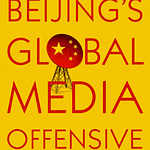
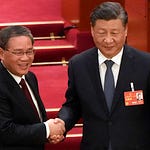

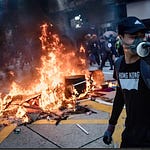
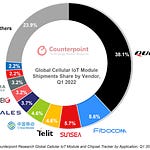

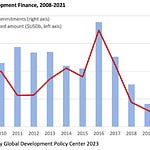
Share this post